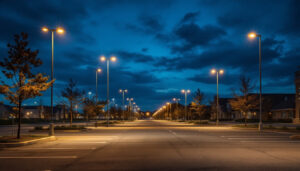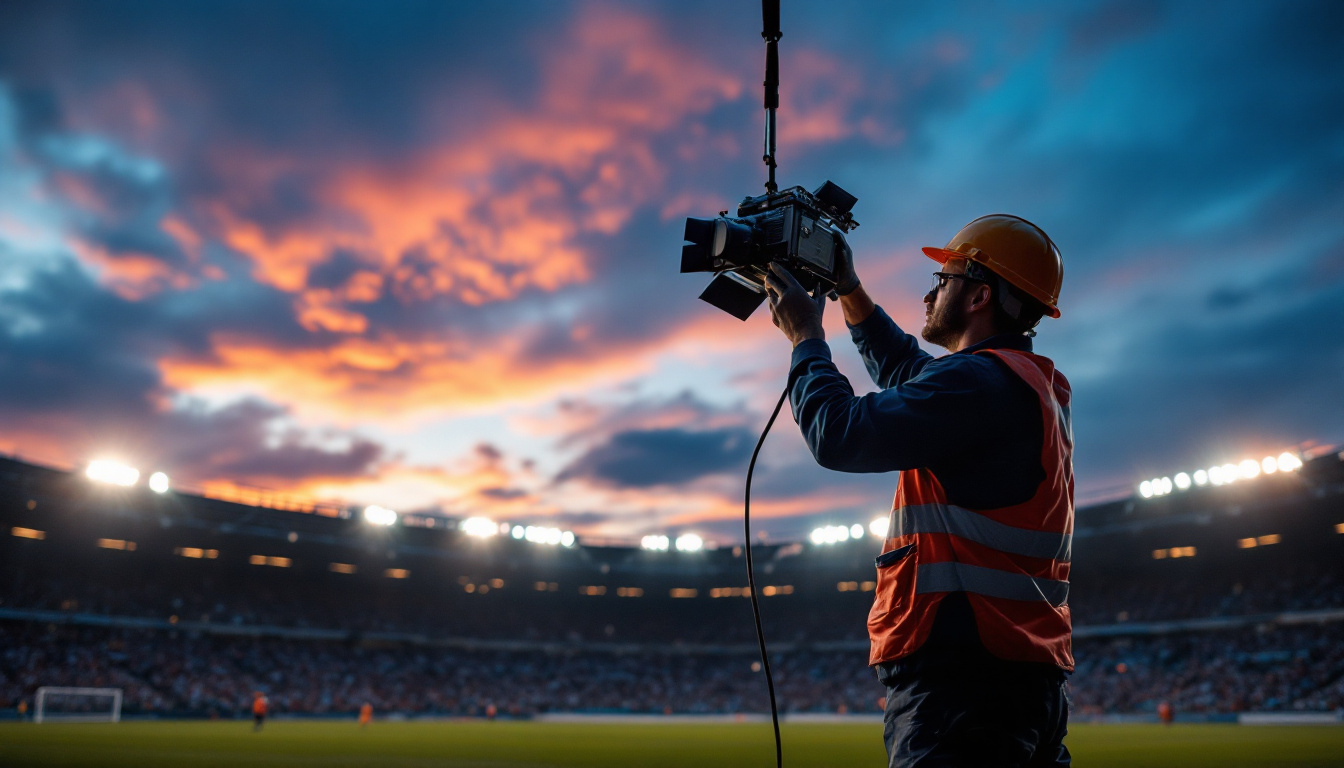

In the world of lighting, the importance of effective stadium lighting cannot be overstated. As a lighting contractor, understanding the nuances of stadium lighting design, installation, and maintenance is crucial for maximizing success in this competitive field. This article explores key strategies and insights that can help lighting contractors excel in stadium lighting projects.
Stadium lighting serves multiple purposes, from enhancing visibility during events to creating an atmosphere that engages fans. Proper lighting not only ensures safety but also elevates the overall experience for players and spectators alike. With the rise of high-definition broadcasts and the increasing demand for night events, the quality of stadium lighting has become a focal point for sports organizations and event planners.
Moreover, effective stadium lighting can significantly impact a venue’s reputation and profitability. Well-lit stadiums attract more events, leading to increased revenue opportunities for contractors involved in the design and installation process. Understanding the multifaceted benefits of stadium lighting can empower contractors to pitch their services more effectively to potential clients.
Safety is paramount in stadium lighting. Lighting contractors must ensure that their designs comply with local regulations and industry standards. This includes adhering to guidelines set by organizations such as the Illuminating Engineering Society (IES) and the National Fire Protection Association (NFPA). Compliance not only protects the contractor from legal issues but also ensures the safety of all individuals using the facility.
In addition to regulatory compliance, contractors should consider the unique safety challenges posed by stadium environments. For instance, lighting must be designed to minimize glare for players and officials while providing adequate illumination for spectators. A thoughtful approach to lighting design can enhance safety and improve the overall experience for everyone involved. Furthermore, the integration of emergency lighting systems is crucial; these systems ensure that exits are clearly marked and accessible in case of an emergency, providing an additional layer of security that is essential for large gatherings.
Lighting plays a crucial role in shaping the fan experience at sporting events. Dynamic lighting systems that can change colors and intensity create a vibrant atmosphere that engages spectators. Contractors should consider integrating advanced technologies, such as LED lighting and smart controls, that allow for customizable lighting scenarios. This flexibility enables venues to adapt their lighting for different events, from concerts to sports games, enhancing the overall experience.
Furthermore, well-designed lighting can highlight key moments during events, such as player introductions or game-winning plays. By strategically placing lights and utilizing programmable systems, contractors can create memorable experiences that resonate with fans and encourage repeat attendance. The use of synchronized lighting effects, which can be timed with music or crowd reactions, adds an extra layer of excitement, transforming a simple game into an unforgettable spectacle. Additionally, incorporating light shows during halftime or breaks can keep the energy high and entertain fans, making the venue a destination for more than just the game itself.
Moreover, the aesthetic appeal of stadium lighting cannot be overlooked. Thoughtfully designed lighting can accentuate the architectural features of a stadium, creating an iconic look that enhances the venue’s identity. This is particularly important for new stadiums aiming to establish themselves in a competitive market. By utilizing innovative lighting designs that reflect the culture and spirit of the community, contractors can help create a unique atmosphere that draws fans in and fosters a sense of pride among local supporters.
To achieve optimal results in stadium lighting projects, contractors must focus on several key components. These elements not only contribute to the effectiveness of the lighting system but also impact the overall success of the project.
A comprehensive lighting design is the foundation of any successful stadium lighting project. This process involves assessing the specific needs of the venue, including the type of events hosted, the layout of the stadium, and the desired ambiance. Collaborating with architects and engineers can help create a cohesive design that meets both functional and aesthetic requirements.
Contractors should also consider the latest lighting technologies available. LED fixtures, for example, offer energy efficiency and longevity, making them a popular choice for stadiums. By staying informed about advancements in lighting technology, contractors can provide clients with innovative solutions that enhance performance while reducing operational costs.
The selection of appropriate fixtures is critical to achieving the desired lighting outcomes. Factors such as brightness, color temperature, and beam angle must be carefully evaluated to ensure optimal performance. For instance, high-intensity discharge (HID) fixtures may be suitable for certain applications, while LED fixtures may be preferred for their energy efficiency and lower maintenance requirements.
Additionally, contractors should consider the environmental impact of their chosen fixtures. Sustainable lighting solutions not only appeal to environmentally conscious clients but can also lead to cost savings through reduced energy consumption and lower maintenance needs.
Once the design and fixture selection are complete, the installation process begins. Proper installation is essential to ensure that the lighting system functions as intended. Contractors must adhere to best practices and safety protocols throughout the installation process, including securing fixtures at appropriate heights and angles.
Maintenance is another critical aspect of stadium lighting. Regular inspections and upkeep can prevent costly repairs and ensure that the lighting system remains in optimal condition. Contractors should establish maintenance schedules and educate clients on the importance of ongoing care to prolong the lifespan of the lighting system.
The integration of technology into stadium lighting is transforming the industry. Lighting contractors can leverage various technologies to enhance their services and improve project outcomes.
Smart lighting systems allow for real-time control and monitoring of stadium lighting. These systems can be programmed to adjust lighting levels based on specific events or conditions, providing flexibility and efficiency. For example, during a night game, the lighting can be automatically adjusted to ensure optimal visibility as the sun sets.
Additionally, smart lighting systems can be integrated with other venue technologies, such as sound systems and video displays, creating a cohesive experience for fans. By offering these advanced solutions, contractors can differentiate themselves in a competitive market and attract more clients.
Data analytics is another powerful tool that lighting contractors can utilize to enhance their services. By collecting and analyzing data on lighting performance, energy consumption, and user feedback, contractors can make informed decisions about future projects. This data-driven approach enables contractors to optimize their designs and demonstrate the value of their services to clients.
Furthermore, analytics can help identify areas for improvement in existing lighting systems. Contractors can use this information to recommend upgrades or modifications that enhance performance and reduce costs, ultimately leading to greater client satisfaction.
Success in the lighting contracting business is not solely dependent on technical expertise; building strong relationships with clients is equally important. Establishing trust and open communication can lead to repeat business and referrals, which are vital for long-term success.
Effective communication is key to understanding client needs and expectations. Lighting contractors should prioritize regular check-ins and updates throughout the project lifecycle, ensuring that clients feel informed and involved. This proactive approach can help prevent misunderstandings and foster a positive working relationship.
Additionally, contractors should be transparent about project timelines, costs, and potential challenges. By setting realistic expectations, contractors can build trust and demonstrate their commitment to delivering high-quality results.
Offering post-project support is another way to strengthen client relationships. After the completion of a stadium lighting project, contractors should remain available for any questions or concerns that may arise. This ongoing support not only reinforces the contractor’s dedication to client satisfaction but also opens the door for future collaboration on maintenance or upgrades.
Furthermore, soliciting feedback from clients can provide valuable insights into their experience and help contractors identify areas for improvement. By actively seeking input, contractors can demonstrate their commitment to continuous improvement and client satisfaction.
In a competitive market, effective marketing strategies are essential for lighting contractors looking to expand their reach and attract new clients. A well-rounded marketing approach can help showcase expertise and differentiate services from competitors.
Establishing a strong online presence is crucial for modern lighting contractors. A professional website that highlights past projects, client testimonials, and services offered can serve as a valuable marketing tool. Additionally, utilizing social media platforms to share project updates, industry news, and engaging content can help contractors connect with potential clients and build a loyal following.
Search engine optimization (SEO) is another important aspect of online marketing. By optimizing website content for relevant keywords, contractors can improve their visibility in search engine results, making it easier for potential clients to find their services.
Networking within the industry can lead to valuable partnerships and referrals. Lighting contractors should actively participate in industry events, trade shows, and local business organizations to connect with potential clients and collaborators. Building relationships with architects, engineers, and event planners can create opportunities for collaboration on future projects.
Additionally, partnerships with suppliers and manufacturers can provide contractors with access to the latest products and technologies, enhancing their offerings and competitiveness in the market.
Maximizing success as a lighting contractor in the stadium lighting sector requires a multifaceted approach. From understanding the importance of effective lighting to leveraging technology and building strong client relationships, each element plays a crucial role in achieving project success.
By focusing on safety, compliance, and enhancing the fan experience, contractors can position themselves as trusted experts in the field. Furthermore, embracing technology, effective communication, and strategic marketing can help contractors stand out in a competitive landscape.
Ultimately, the key to success lies in a commitment to quality, innovation, and client satisfaction. By adopting these strategies, lighting contractors can not only meet the demands of the industry but also thrive in an ever-evolving market.
Ready to elevate your stadium lighting projects with the highest quality products at the best value? Look no further than LumenWholesale. Our spec-grade lighting solutions are designed to meet the rigorous demands of stadium environments, ensuring you deliver on safety, compliance, and the ultimate fan experience. With unbeatable wholesale prices and the convenience of free shipping on bulk orders, you can confidently tackle any project, big or small. Discover the LumenWholesale difference and make us your go-to source for all your lighting needs.

Discover why purchasing outdoor wall lights in bulk from local distributors might not be the best choice.

Discover the essentials of LED strip light retrofit kits with this comprehensive guide tailored for lighting contractors.

Discover expert insights on choosing and installing indoor sensor lights with ease.

Discover the essential insights lighting contractors need to know about motion sensor lights.
Get notified when NEW deals are released.
Optimize your budget with wholesale discounts.
Only top-quality, specification-grade lighting products.
No additional costs at checkout - what you see is what you pay.
We understand the unique needs of contractors.